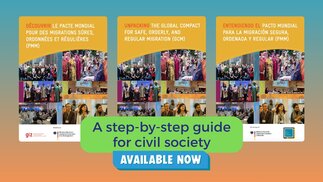Unlocking Insights on Global Migration: New Resources Released!
Two new resources to support state and civil society actors in global migration processes have been launched. The brochure “Unpacking the GCM” and the booklet “Navigating Global Migration Processes” provide practical guidance and key insights for effective involvement and advocacy.
Unpacking the GCM

Although many stakeholders have heard of the Global Compact for Safe, Orderly, and Regular Migration (GCM), its relevance and significance often remain unclear. The Deutsche Gesellschaft für Internationale Zusammenarbeit (GIZ) GmbH has teamed up with the Civil Society Action Committee to make information on the GCM more accessible. This collaboration has produced a brochure titled “Unpacking the GCM”. This resource breaks down what the Compact means and offers concrete guidance on how civil society, including diaspora organisations, can engage meaningfully with it.
Since its adoption in 2018, the GCM has served as the first internationally agreed framework to address migration comprehensively. Though not legally binding, it includes 10 principles and 23 objectives to help governments formulate and implement policies for safe, orderly, and regular migration.
Objective 19, in particular, focuses on creating conditions for migrants and diasporas to fully contribute to sustainable development — offering an important reference point for diaspora-led initiatives and advocacy.
A Practical Guide for State and Civil Society Actors

Additionally, MEG has created a booklet titled “Navigating Global Migration Processes: Booklet for State Actors and Civil Society”, which serves as a practical guide for state and civil society actors involved in two global processes: the Global Forum on Migration and Development (GFMD) and the GCM, including the Regional Migration Reviews and the International Migration Review Forum. This booklet offers a structured approach to navigating these processes.
The guide features charts and infographics sourced from official GFMD and GCM websites, making it a user-friendly tool for understanding the dual existence and operationalisation of the GCM and GFMD processes. It aims to foster equitable partnerships and advance migration diplomacy through collective advocacy.